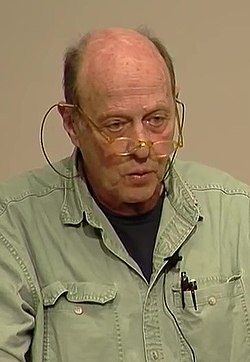James C. Scott Quote
Much history as well as popular imagination not only erases their contingency but implicitly attributes to historical actors intentions and consciousness they could not have possibly had...Once a significant historical event is codified, it travels a sort of condensation symbol and, unless we are very careful, takes on a false logic and order that does a grave injustice to how it was experienced at the time.
James C. Scott
Much history as well as popular imagination not only erases their contingency but implicitly attributes to historical actors intentions and consciousness they could not have possibly had...Once a significant historical event is codified, it travels a sort of condensation symbol and, unless we are very careful, takes on a false logic and order that does a grave injustice to how it was experienced at the time.
Related Quotes
About James C. Scott
James Campbell Scott (December 2, 1936 – July 19, 2024) was an American political scientist and anthropologist specializing in comparative politics. He was a comparative scholar of agrarian and non-state societies.
Trained as a political scientist, Scott's scholarship discussed peasant societies, state power, and political resistance. From 1968 to 1985, Scott wrote influentially on agrarian politics in peninsular Malaysia. While he retained a lifelong interest in Southeast Asia and peasantries, his later works ranged across many topics: quiet forms of political resistance, the failures of state-led social transformation, techniques used by non-state societies to avoid state control, commonplace uses of anarchist principles, and the rise of early agricultural states.
Scott received his bachelor's degree from Williams College and his MA and PhD in political science from Yale. He taught at the University of Wisconsin–Madison until 1976 and then at Yale, where he was Sterling Professor of Political Science. In 1991, he became director of Yale's Program in Agrarian Studies. At the time of his death, The New York Times described Scott as among the most widely read social scientists.
Trained as a political scientist, Scott's scholarship discussed peasant societies, state power, and political resistance. From 1968 to 1985, Scott wrote influentially on agrarian politics in peninsular Malaysia. While he retained a lifelong interest in Southeast Asia and peasantries, his later works ranged across many topics: quiet forms of political resistance, the failures of state-led social transformation, techniques used by non-state societies to avoid state control, commonplace uses of anarchist principles, and the rise of early agricultural states.
Scott received his bachelor's degree from Williams College and his MA and PhD in political science from Yale. He taught at the University of Wisconsin–Madison until 1976 and then at Yale, where he was Sterling Professor of Political Science. In 1991, he became director of Yale's Program in Agrarian Studies. At the time of his death, The New York Times described Scott as among the most widely read social scientists.
